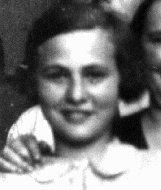You searched for: 公募私募系统源码定制开发【TG���������@EK7676】平台包网搭建公募私募系统源码定制开发【TG���������@EK7676】平台包网搭建1wW6pnGvVO
<< Previous | Displaying results 441-450 of 653 for "公募私募系统源码定制开发【TG���������@EK7676】平台包网搭建公募私募系统源码定制开发【TG���������@EK7676】平台包网搭建1wW6pnGvVO" | Next >>
-
Lisa Nussbaum
ID CardLisa was born to a Jewish family who lived in a town about three miles from the German border. Her family had lived there for generations. Lisa's father exported geese to Germany, and her mother owned a fabric store. The family lived with Lisa's grandmother in a large, single-level, gray stucco house. Lisa attended a small Hebrew school in Raczki. 1933-39: In 1937 Lisa transferred to a public school. One day, in fifth grade during recess, some boys grabbed her long blonde hair. Others joined in and pinned…
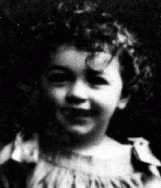
-
Urszula Kaczmarek
ID CardUrszula was one of four children born to Franciszek and Jadwiga Kaczmarek, who lived in the industrial city of Poznan in western Poland. The family lived at 11 Smolnej Street. Like their parents, the Kaczmarek children were baptized in the Roman Catholic faith. 1933-39: As one of the older children in the family, Urszula helped her mother with the housework. She was 10 years old when the Germans invaded Poland on Friday, September 1, 1939. German planes bombed Poznan that same day, and German troops…
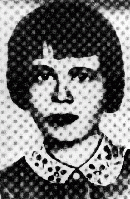
-
Aaron Lejzerowicz
ID CardAaron was one of four children born to a Jewish family in the northeastern Polish town of Zdzieciol. His father was a shoemaker and, along with a business partner, he also ran a shoe store in the town. Aaron attended a private Jewish school, where he studied the Polish language and history as well as Jewish history and Hebrew. 1933-39: On September 1, 1939, Germany invaded Poland. Three weeks later, Poland was partitioned between Germany and the Soviet Union [under the German-Soviet Pact]. Aaron and his…
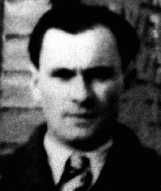
-
Paula Wajcman
ID CardPaula was raised in a religious Jewish family in Kielce, a city in the southeast of Poland. Her family lived in a modern two-story apartment complex. Paula's father owned the only trucking company in the district. Her older brother, Herman, attended religious school, while Paula attended public kindergarten in the morning and religious school in the afternoon. 1933-39: Paula's school uniform was a navy blazer with a white blouse and pleated skirt. At age 9, she did the "Krakowiak" dance at school. Boys…
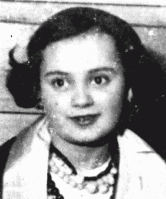
-
Jakob Frenkiel
ID CardJakob was one of seven boys in a religious Jewish family. They lived in a town 50 miles west of Warsaw called Gabin, where Jakob's father worked as a cap maker. Gabin had one of Poland's oldest synagogues, built of wood in 1710. Like most of Gabin's Jews, Jakob's family lived close to the synagogue. The family of nine occupied a one-room apartment on the top floor of a three-story building. 1933-39: On September 1, 1939, just a few months before Jakob turned 10, the Germans started a war with Poland.…
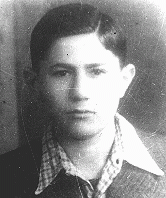
-
Peter Somogyi
ID CardPeter and his twin brother, Thomas, were the youngest of three children born to an observant Jewish family. They lived in Pecs, an industrial center where goods such as bricks and ceramics were produced. Peter's father owned a prosperous business selling accessories and parts for cars, motorcycles and bicycles. He was also a regional sales representative for Ford automobiles. 1933-39: A German nanny took care of Peter, Thomas, and their older sister. She taught them German and they became quite fluent.…
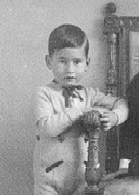
-
Rachel Lejzerowicz Rechnitz
ID CardRachel, or Ruchla as she was called, was raised by Jewish parents in the small southwestern Polish town of Bedzin. In 1930 she moved with her husband, Bernard, to the nearby city of Katowice, where Bernard had a wholesale leather business. The couple lived with their two children, Moses and Genia, in a three-bedroom, upper-floor apartment on Jordana Street. 1933-39: Ruchla was active in Hadassah, a women's Zionist organization, and in 1939 she and her husband prepared to immigrate to Palestine [Aliyah…
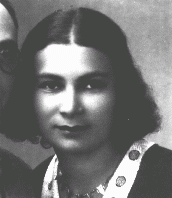
-
Feige Schwarzfink
ID CardFeige was born to a religious Jewish family in the small village of Szydlowiec [in Poland]. She lived with her parents, six brothers and sisters, and elderly grandparents in a small house which, like many homes in the village, had no running water, indoor plumbing, or electricity. Feige's father was a shoemaker. 1933-39: In the afternoons after public school Feige studied at a Jewish religious school. Although her parents didn't know it, she attended meetings of the Bund, the Jewish Socialist party. Feige…
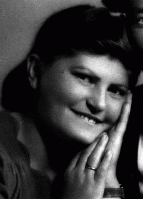
-
Helena Manaster
ID CardHelena was the eighth of 10 children born to a Jewish family in the town of Lesko. Her father was a landowner. When Helena was a young girl the family moved to nearby Orelec, where they had a summer home. As there were no schools in Orelec, Helena and her siblings continued attending school in Lesko. Later, Helena traveled three hours by train daily to attend the nearest high school, which was in Przemysl. 1933-39: The German army invaded Poland on September 1, 1939. By the beginning of October the…
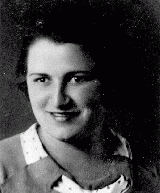
-
Celia Petranker
ID CardCelia was the youngest of three daughters born to Jewish parents living in Stanislav [Stanislawow], Poland. Her father was an ardent Zionist, and dreamed of moving his family to Palestine to help build a Jewish homeland. Celia and her sisters attended private Hebrew primary and secondary schools to help prepare them for their eventual immigration to Palestine. 1933-39: Celia's oldest sister, Pepka, left for Palestine one week after the Germans invaded Poland on September 1, 1939. Pepka's departure was…
